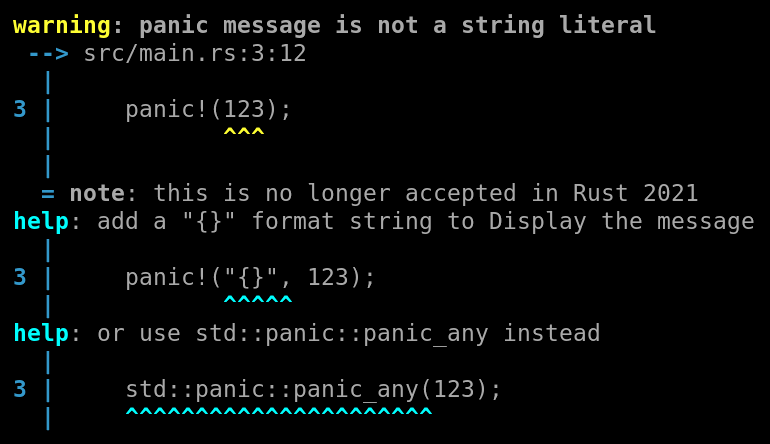When token-based attribute handling is implemeneted in #80689,
we will need to access tokens from `HasAttrs` (to perform
cfg-stripping), and we will to access attributes from `HasTokens` (to
construct a `PreexpTokenStream`).
This PR merges the `HasAttrs` and `HasTokens` traits into a new
`AstLike` trait. The previous `HasAttrs` impls from `Vec<Attribute>` and `AttrVec`
are removed - they aren't attribute targets, so the impls never really
made sense.
Crate root is sufficiently different from `mod` items, at least at syntactic level.
Also remove customization point for "`mod` item or crate root" from AST visitors.
Rollup of 11 pull requests
Successful merges:
- #80523 (#[doc(inline)] sym_generated)
- #80920 (Visit more targets when validating attributes)
- #81720 (Updated smallvec version due to RUSTSEC-2021-0003)
- #81891 ([rustdoc-json] Make `header` a vec of modifiers, and FunctionPointer consistent)
- #81912 (Implement the precise analysis pass for lint `disjoint_capture_drop_reorder`)
- #81914 (Fixing bad suggestion for `_` in `const` type when a function #81885)
- #81919 (BTreeMap: fix internal comments)
- #81927 (Add a regression test for #32498)
- #81965 (Fix MIR pretty printer for non-local DefIds)
- #82029 (Use debug log level for developer oriented logs)
- #82056 (fix ice (#82032))
Failed merges:
r? `@ghost`
`@rustbot` modify labels: rollup
This is a pure refactoring split out from #80689.
It represents the most invasive part of that PR, requiring changes in
every caller of `parse_outer_attributes`
In order to eagerly expand `#[cfg]` attributes while preserving the
original `TokenStream`, we need to know the range of tokens that
corresponds to every attribute target. This is accomplished by making
`parse_outer_attributes` return an opaque `AttrWrapper` struct. An
`AttrWrapper` must be converted to a plain `AttrVec` by passing it to
`collect_tokens_trailing_token`. This makes it difficult to accidentally
construct an AST node with attributes without calling `collect_tokens_trailing_token`,
since AST nodes store an `AttrVec`, not an `AttrWrapper`.
As a result, we now call `collect_tokens_trailing_token` for attribute
targets which only support inert attributes, such as generic arguments
and struct fields. Currently, the constructed `LazyTokenStream` is
simply discarded. Future PRs will record the token range corresponding
to the attribute target, allowing those tokens to be removed from an
enclosing `collect_tokens_trailing_token` call if necessary.
Add lint for `panic!(123)` which is not accepted in Rust 2021.
This extends the `panic_fmt` lint to warn for all cases where the first argument cannot be interpreted as a format string, as will happen in Rust 2021.
It suggests to add `"{}",` to format the message as a string. In the case of `std::panic!()`, it also suggests the recently stabilized
`std::panic::panic_any()` function as an alternative.
It renames the lint to `non_fmt_panic` to match the lint naming guidelines.

This is part of #80162.
r? ```@estebank```
Set tokens on AST node in `collect_tokens`
A new `HasTokens` trait is introduced, which is used to move logic from
the callers of `collect_tokens` into the body of `collect_tokens`.
In addition to reducing duplication, this paves the way for PR #80689,
which needs to perform additional logic during token collection.
A new `HasTokens` trait is introduced, which is used to move logic from
the callers of `collect_tokens` into the body of `collect_tokens`.
In addition to reducing duplication, this paves the way for PR #80689,
which needs to perform additional logic during token collection.
rustc_parse: Better spans for synthesized token streams
I think using the nonterminal span for synthesizing its tokens is a better approximation than using `DUMMY_SP` or the attribute span like #79472 did in `expand.rs`.
r? `@Aaron1011`
- Adds optional default values to const generic parameters in the AST
and HIR
- Parses these optional default values
- Adds a `const_generics_defaults` feature gate
Properly handle attributes on statements
We now collect tokens for the underlying node wrapped by `StmtKind`
nstead of storing tokens directly in `Stmt`.
`LazyTokenStream` now supports capturing a trailing semicolon after it
is initially constructed. This allows us to avoid refactoring statement
parsing to wrap the parsing of the semicolon in `parse_tokens`.
Attributes on item statements
(e.g. `fn foo() { #[bar] struct MyStruct; }`) are now treated as
item attributes, not statement attributes, which is consistent with how
we handle attributes on other kinds of statements. The feature-gating
code is adjusted so that proc-macro attributes are still allowed on item
statements on stable.
Two built-in macros (`#[global_allocator]` and `#[test]`) needed to be
adjusted to support being passed `Annotatable::Stmt`.
We now collect tokens for the underlying node wrapped by `StmtKind`
instead of storing tokens directly in `Stmt`.
`LazyTokenStream` now supports capturing a trailing semicolon after it
is initially constructed. This allows us to avoid refactoring statement
parsing to wrap the parsing of the semicolon in `parse_tokens`.
Attributes on item statements
(e.g. `fn foo() { #[bar] struct MyStruct; }`) are now treated as
item attributes, not statement attributes, which is consistent with how
we handle attributes on other kinds of statements. The feature-gating
code is adjusted so that proc-macro attributes are still allowed on item
statements on stable.
Two built-in macros (`#[global_allocator]` and `#[test]`) needed to be
adjusted to support being passed `Annotatable::Stmt`.